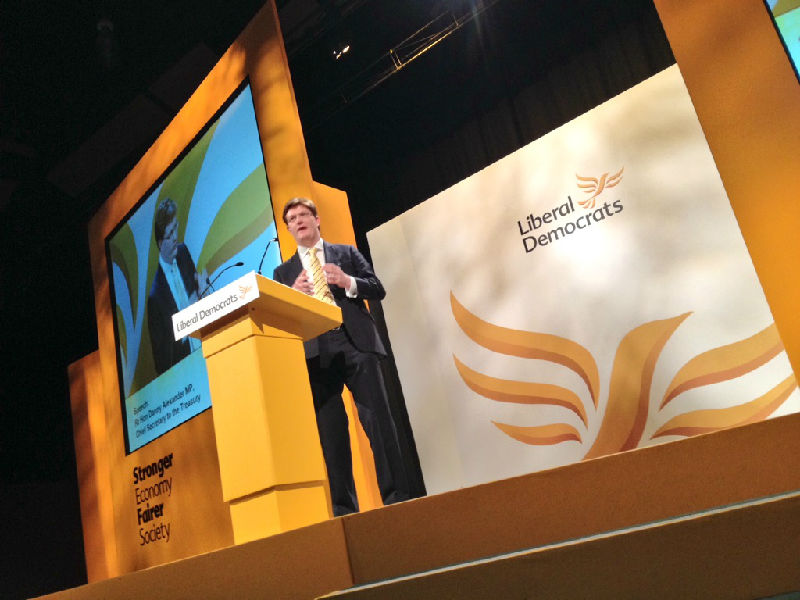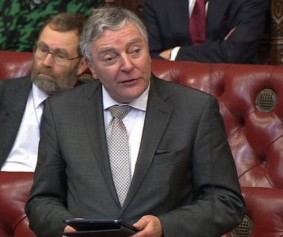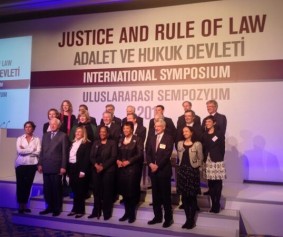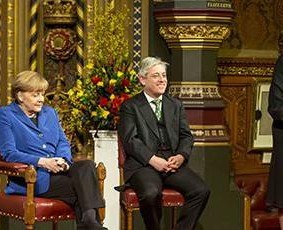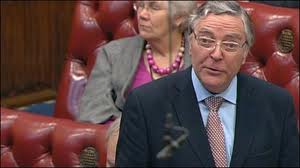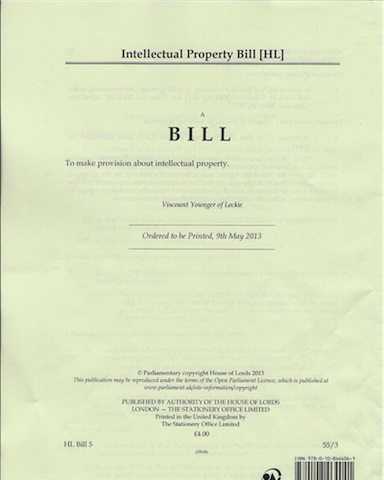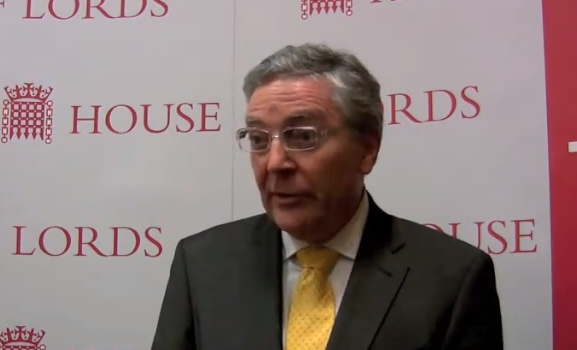Danny Tells the Lib Dems' Record on the Economy
Excellent speech from Danny Alexander the Chief secretary at the Lib Dem's Spring Conference in York. A Stronger Economy and a Fairer Society indeed.
http://www.libdems.org.uk/danny_alexander_s_speech_to_spring_conference
Happy New Year of the Horse!
The 31st January this year marks the start of the Chinese New Year.
Gong Xi Fa Cai in Mandarin and Kung Hei Fat Choi in Cantonese to you!
The Horse is an energetic creature and apparently "the fire energies will be strong" this year. So let's make the most of it!
Lord C-J looks to the Future of IP policy
I recently gave a speech to the Inside Government Intellectual Property 2014 Conference
Here is the text.
Intellectual Property Policy:The Way Forward
In modern times Britain has become renowned in for its creative industries, in particular for pre-eminence in the world of pop and rock music, for the work of its designers and architects and for its television and film content and formats. We are now coming to the fore in fashion and computer games.
This creative output comprises one of the UK's great assets.The UK’s creative industries are now worth £71.4 billion per year to the UK economy, at least 5% of the UK Economy and 10 % of all UK exports.
Sector growth outperforms all other sectors of UK industry and it now accounts for almost two million jobs.
A crucial factor in recent growth has been the tax treatment of film production. This has been followed by high end television and animation and in April the video games relief was cleared by the EU. The new theatre production tax relief and patent box will have a major impact too.
In July we saw launch by the Creative Industries Council of Create UK, the creative industries strategy. Its aim is to double the sector’s annual exports to £31 billion by 2020.
At the launch Vince Cable announced a £16m funding package to boost skills in the creative industries. This injection of capital investment is part of the Government's strategy to support the UK's position as a world leader in the sector.
Create UK calls for a “stable legal framework that allows rights to be protected and commercialised” and says “any consideration of amendments to the IP frameworks” needs to be “thorough, objective, evidence-based and transparent”.
This however has been far from the case since the conclusion of the Report by Professor Ian Hargreaves in 2011 designed to set out how the intellectual property framework can promote innovation and economic growth in the UK economy.
The impression given by the Report was that intellectual property rights are a barrier to innovation.
Even as far back as the landmark Statute of Anne in 1710 however the benefits of copyright, particularly the rights of creators, were recognized.
Indeed the title of the Act is: “An Act for the Encouragement of Learning, by Vesting the Copies of Printed Books in the Authors or Purchasers of Copies.., etc”
As a result the provisions of the Digital Economy Act passed in the washup before the General Election of 2010, which would have given the creative industries some protection from digital piracy, remain unimplemented.
I myself in trying to make sure that there were greater powers to block infringing websites found myself depicted as an internet villain!
Luckily and thanks to the industry the Newzbin2 case brought by the MPA and the UK Pirate Bay case have established that an existing provision of the CDPA 1988 is effective in taking down these sites.
Following the Hargreaves Report we have had the Enterprise and Regulatory Reform Act which set out the legal basis for introduction of new copyright exceptions, Extended Collective Licencing and the treatment of Orphan Works.
It is hard to see, despite the elaborate process undertaken to introduce Exceptions, what major positive impact any of these with the possible exception of Parody, will have.
Indeed in a number of cases they seem to militate against the commercial licensing solutions being made available by rights owners.
Extended collective licensing and orphan works provisions have a narrow UK application and similarly are unlikely to make a major impact.
One area where there have been positive development is in the field of designs.
The ERR Act ensured that works of Artistic design would be protected (think chairs!) with the repeal of s52 now under consultation and the Intellectual Property Act introduced a criminal penalty for infringement of registered designs.
Admittedly some of us felt this should go further in the light of the fact that protection for 2D is so much better than for 3D.
Moreover in the end the provisions of the Bill were watered down so the test of whether a design was “substantially” copied was replaced by “with features which differ only in immaterial detail” for the purposes of criminal prosecution.
The ERRA also laid the ground for Collecting Societies Codes of Practice which lay down minimum standards of behaviour. Given the power of the collecting organizations this was welcome.
One major and welcome fruit of the Report is however the Copyright Hub which made a bright start thanks to Richard Hooper and Dr Ros Lynch. Compared with nearly all the other reforms the voluntary solution of the Copyright Hub is highly likely to have a major impact combined with international application.
The Hub has received £150k in goverment funding. According to its new director Dominic Young it is changing from “signposting tool” into an “intelligent router” and it will make a major difference in taking down the barriers to effective copyright licensing.
But it will be shortly totally reliant on private sector business funding and I hope the industry will make sure that it goes on to be a great success with the necessary resources.
If it does, it has the potential to be a Global Hub for copyright licensing. London and the UK could be at the centre of a hugely significant and powerful means of ensuring that creators receive the fruits of their endeavours worldwide.
We are also making strides in music licensing through the Global Repertoire Database RD which has its Operations HQ in London
Throughout the reform process the creative industries sector have been concerned by the potential negative impact the reforms could have, with the potential to deter investment, risk jeopardising market-led developments and weaken performer/creators ability to benefit financially from their work.
Changes to IP law should be adopted only in response to a well defined public policy objective and market failure. They should be underpinned by robust Impact Assessments. In fact the quality of these has been poor.
Reform of copyright should be handled sensitively with the value of the creative industries, and any negative impact caused by changes to the law, firmly in mind and this has clearly not been the case.
Furthermore investment in the UK's creative industries can only really make a difference if the industry's intellectual property rights, particularly relating to the protection of their online materials, are properly enforced.
The industry has changed dramatically in the wake of the digital revolution. That there is a major issue regarding online intellectual property theft, in the form of illegal downloads accessed via pirate websites, is beyond dispute.
Communications watchdog Ofcom revealed last year that a staggering 1.5 billion files were illegally downloaded in 2012.
The MPAA in their report “Understanding the Role of Search in Online Piracy” assess the value lost through of piracy in the UK at £400m pa for music and film alone.
Indeed, the issue of intellectual property theft goes beyond the creative industries and impacts financial, professional and support services - industries that collectively form the backbone of the UK economy and the 'knowledge-based' economy that the UK has long relied upon for success.
The Chancellor George Osborne has recently spoken about promoting Britain's financial technology industry - or FinTech - as a global pioneer in alternative funding vehicles and digital currencies, such as Bitcoin.
However, the UK cannot hope to become a leader in this field without rigorous IP protection and enforcement.
The post Hargreaves reforms are not designed to prevent online piracy.
Advertising, often by well known brands on pirate websites, is propping up the pirates and encouraging them to continue in their IP theft activities.
The Police Intellectual Property Crime Unit (PIPCU), a specialist IP crime unit within the City of London Police, has been engaged in activities designed to disrupt the flow of money from advertisements to those that run copyright infringing websites.
The Follow the Money initiative led by Mike Weatherley MP, the former intellectual property adviser to the Prime Minister which is designed to get voluntary agreement from the advertisers and credit card companies not to advertise on these sites is a significant and welcome development.
The fact remains though that IP piracy represents an existential threat to the UK creative industries and the Government needs to put an emphasis on enforcement if it is to help the industry assert its intellectual property rights and combat the online pirates.
Major search engines have an important role to play too. They have often had an uneasy relationship with the likes of the BPI who demonstrate that illegal sites persist in coming high on search rankings despite literally millions of infringement notifications to them.
Google have recently announced moves which will downrank illegal download websites in searches.
There also needs to be a coordinated push to educate people of the importance of IP and of only downloading legitimate material via legal websites. This ordinarily means of course that people must pay for content and be strongly discouraged from illegal downloading.
The recent report Copyright Education and Awareness published this month by Mike Weatherley and rights holders such as the PRS is a greatly welcome development.
Of course he has already made a major contribution to IP education through Rock and Film the House which he founded.
We shall have to erect a statue to him when he leaves Parliament next year!
A key recommendation is about the IPO and a recommendation that there a broader IP Director General role is created along the lines of the US IP Tsar.
The Culture Media and Sport Committee rightly in its report last year raised a question mark over the Intellectual Property Office’s ability to be a strong IP champion but with recent personnel changes to that office I am much more optimistic that a major change in mindset is occurring.
The fact is however if the UK creative industries are to remain the powerhouse they currently are, people need to pay for creative content that the industries produce.
There are a number of vital aspects that need attention:
- The protection of IP must be rigorously enforced and the Government should consider either implementing the provisions of the Digital Economy Act or ensuring that robust voluntary arrangements exist with the internet service providers, so that piracy is detected and deterred.
- Digital copyright infringement sanctions need to be enhanced. We urgently need to equalise the maximum penalties for digital and physical IP infringement. I look forward to the outcome of the Government’s current review of the use of copyright infringement sanctions which is expected to report in November.
- We need to ensure too that there is a common understanding across the creative industries of what metadata needs protecting and how to do this. We need general acceptance of the Voluntary Code of Practice for Creating and Retaining Metadata in Images.
- PIPCU –the Police Intellectual Property Crime Unit-is a vital resource in combatting counterfeits and infringers. It has made a huge impact in its first year of operation. We -Government and industry- need to ensure its future funding beyond 2015.
- Then of course during the passage of the Consumer Rights Bill I have been arguing for better protection against lookalike products which whilst falling short of being counterfeit nevertheless are designed to give the cynical impression through sailing close to IP infringement that they are equivalent to the original product.
- 3D printing is already throwing up important issues. What forward thinking has been carried out by the IPO?
As it is there are major other issues coming down the track from Brussels. After an EU discussion paper in 2011 on the Single Market for Intellectual Property Rights debate will take place on matters such as user generated content, further artists resale rights and other reforms.
DG Markt and DG Connect are clearly at odds. Where does the UK stand in this debate? In fact we need a great deal more European cooperation through for instance the European Union Observatory on the Infringement of Intellectual Property Rights rather than a raft of reforms.
The recent International Summit IP Enforcement Summit hosted by BiS and the IPO in London, designed to co-ordinate strategy and action was exactly what is needed.
The international dimension of IP is important to our ability to monetize our creativity overseas. I chaired an IP roundtable at a TIF-IN Conference in Qingdao, China for the creative industries and IP protection is a fundamental issue in doing business in emerging markets.
To its credit the Government have placed IP attaches in major markets such as China and Brazil which can advise UK companies on the IP landscape.
In conclusion.In the UK we have the potential to be the recognized world leader in the development of the digital economy.
But of course now in the digital economy there is increasing convergence –indeed symbiosis- between platform and content, between the tech sector and the creative industries.
creative industries.
There is no doubt that each sector is increasingly making use of relevant skills in the other and that of course means valuing the intellectual property of each other.
In recent otherwise excellent manifestos from the TechUK –which I helped to launch-and from COADEC there is no mention of Intellectual Property.
So my parting shot to the Tech sector is, please acknowledge digital realities, you and the creative industries need each other so recognize the value of IP and the fact you have a common interest in protecting it!
Thank you
Peers Debate the WWW on its 25th Anniversary
Martha Lane Fox until recently the Government's UK Digital Champion initiated a wide ranging debate that has been widely reported.
http://diginomica.com/2014/01/17/kind-world-wide-web-want/
http://www.bbc.co.uk/news/uk-politics-25757175
Here is my contribution which focuses on the ethical standards we need in the future.
I too congratulate B Lane Fox not only for opening this debate in such an inspiring way but in so successfully carrying out her role as the Government’s UK Digital Champion
The use of the internet in the UK climbs inexorably.
We celebrated the universality of the web at the Olympic opening Ceremony with Sir Tim Berners Lee tweeting "This is for everyone", which was instantly spelled out in lights attached to the tablets on the chairs of the 80,000 people in the audience.
And I absolutely share the N Baroness's concern to ensure that no one is excluded.
Having come to the Web myself some 20 years ago standing here with my iPad with all its apps I still find the speed of developments since I first used the Netscape browser quite extraordinary.
Sir Tim and the early pioneers of the web deserve huge recognition for their setting of the open and neutral standards which ensured the growth of the WWW.
The fact is however that the development of ethical safeguards and standards now needs to evolve at the same pace as the range of applications.
The web is not some kind of foreign country where ordinary rules of conduct don’t apply. We need an alignment of online and offline rights and protections.
Freedom of expression is a vital principal that needs to upheld both online and offline but this needs to be balanced with rights of privacy.
One Commentator has said that Silicone Valley appears to regard privacy as a “marketable commodity”. Government through through what we now know about its access to the PRISM programme appears to have a similar view. It is vital that we have maximum control over our own metadata.
The UK’s ranking in the the WWW Foundation's Web Index is reduced by concerns over its attitude to privacy rights. I hope that Communications Data bill will not Essay Writing Services resurface in its previous form. So I welcome the campaign - the Web We Want and the statement of 19th December coordinated by the Foundation.
I also welcome the recognition by the PM and the S of S for CMS of the need for adequate filtering to protect young people from online abuse But as was discussed in this House only recently with Lady Howe’s online Safety Bill shouldn’t we be making filtering compulsory? Is it enough simply to leave it up to parents to make the choice about appropriate safety features?
There is concern about the content of online music videos highlighted among others by Reg Bailey in his review into the Commercialisation and Sexualisation of Children
The currently proposed amendment to the Video Recordings Act designed to ensure that content which is presently exempt from classification, but unsuitable and potentially harmful for younger children, will in future require BBFC classification but it only covers hard copy video works.
Shouldn’t online music videos containing sexual or explicit content should be subject to the same age ratings and regulations?
As my Rt hon friend the DPM has advocated we do need better guidance for young people too about the dangers of online pornography
I can also ask my perennial question too my Lords: When can we expect full implementation of the Digital Economy Act 2010 or at the very least an alternative effective remedy to combat online copyright piracy?
Lord C-J Debates freedom of speech in Turkey
I recently attended a major conference on the Rule of Law in Istanbul alongside a number of other senior British Parliamentarians and representatives and a very broad cross section of NGO's, judges and others concerned with human and civil rights from a wide variety of jurisdictions. The Rule of Law and Freedom of Expression are crucial issues in Turkey today and are under threat. Here is what I said.

Media and Internet in a Democratic State
Freedom of the media is a vital pillar of the rule of law and its protection is related strongly to the independence of the judiciary as we heard this morning. It is also a very topical subject on which to end this superb symposium and very closely related to the health of democracies both old and new.
The 20th century philosopher Alexander Meiklejohn put it well when he that stated democracy cannot not be true to its essential ideal if those in power are able to manipulate the electorate by withholding information and stifling criticism.
Today’s panel session is very timely. Back in 1993 May 3rd was designated by UNESCO as World Press Freedom day.
It is a day to celebrate the fundamental principles of press freedom; to evaluate press freedom around the world, to defend the media from attacks on their independence and to pay tribute to journalists who have lost their lives in the exercise of their profession.
In this month of May in particular therefore we should remember that it is often journalists who pay the price for protecting freedom of expression
In the words of the former SundayTimes editor Harold Evans “The price of truth has gone up grievously,” commenting on the terrible annual roll call of journalists who die whilst carrying out their profession.
At the beginning of every year, the International Federation of Journalists (IFJ) publishes a report on the journalists killed in this previous year. 105 journalists and news media personnel were killed during 2013.
In that context we should remember Hrant Dink the editor of Agos who was killed in Istanbul 7 years ago.
Although there are some broad principles enunciated in Article 19 of the International Covenant on Civil and Political Rights( ICCPR) article 10 of the ECHR and the American First Amendment, in my own country Britain much of the development of traditional freedoms are judge made and depend on the decisions of the courts made at different times in response to different events.
It has often taken stubborn and courageous individuals to taken action to defend these principles and to have secured freedom of speech and of the press.
John Milton the famous poet, author of Paradise Lost and religious puritan, in Areopagitica, a famous defence of free speech and against the licensing of publication and censorship and was published in 1644 without a license, made an impassioned plea for freedom of expression stating:
"Give me the liberty to know, to utter, and to argue freely according to conscience, above all liberties."
In my former political party the Liberal Party, the predecessor to the Liberal Democrats, a copy of Areopagitica was ceremonially handed to each incoming President to remind us all of the importance of free speech.
Milton was however unsuccessful in persuading Oliver Cromwell’s government to abolish licensing and censorship.
Some say in fact that our current freedoms in Britain arose by accident when the Licensing of the Press Act 1662, which was time limited to two years, was by an oversight not renewed by Parliament in 1679.
This led temporarily to what has been called “an explosion of news print”.
The Act was in fact renewed a few years later but the benefits of a free press had clearly been shown and in 1695 the Licensing Act was repealed- the last time as our media have recently been reminding us-Britain had statutory regulation of the press.
It was to transform Britain into a nation of news lovers and the liberty of the press rapidly became a cornerstone of British democracy.
As if to remind us in the British Parliament of the importance of the freedom of the press there is currently an exhibition taking place in Parliament featuring portraits and caricatures of one of the most famous defenders of press freedom in Britain, John Wilkes.
John Wilkes was a member of the British parliament who turned to journalism. In 1762 he launched a newspaper, the 'North Briton', aimed at countering the policy of the government headed by the Scottish Earl of Bute to make peace with France.
Through his writing he successfully forced The Prime Minister's resignation but he went too far and criticized the Monarch, King George III directly. The result was the issuing of a warrant seeking his arrest for the publication of what was called a seditious libel.
Wilkes successfully claimed privilege as an MP to secure his release but soon was expelled from the House of Commons and was forced to go into exile, remaining abroad for the next five years.
During this period he once again faced charges for seditious libel; he was sentenced to 22 months in prison. But by this time he was a national celebrity. He successfully re-entered politics even becoming Lord Mayor of the city of London !
Yet whilst we can celebrate the historic breakthroughs of the past very few countries including the UK nowadays are immune from criticism.
The annual index of media freedom, Freedom of Press, is published by the US-based Freedom House, an NGO established in 1941 that has been ranking countries worldwide since 1980 in relation to democracy, human rights and press freedom
Britain in the 2014 index has slipped down their global rankings as a result of the UK government's actions in relation to the Guardian newspaper over its reporting of whistleblower Edward Snowden's surveillance disclosures, with threats of legal action, the destruction of computer hard drives and the nine-hour detention of David Miranda, the partner of journalist Glenn Greenwald, at Heathrow en route from Berlin to his home in Rio de Janeiro.
Generally however Freedom House say that said press freedom worldwide has fallen to its lowest level for over a decade. It partly blames regressive steps in countries such as Egypt, Libya, Jordan, Turkey and Ukraine, as well as the actions taken against journalists reporting on national security issues in both the US and UK.
Sadly a large essaywritingstar.com change occurred in Turkey’s ranking, whose classification has moved from Partly Free to Not Free. This reinforces the Pen International Report on restrictions on freedom of expression following the Gezi Park protests.
It seems that constitutional guarantees of freedom of the press and expression are only partially upheld in practice, undermined by restrictive provisions in the criminal code and the Anti-Terrorism Act.
According to the committee to Protect Journalists Turkey remains the world’s leading jailer of journalists in 2013, with 40 behind bars as of December 1,
The fall in the rankings was of course before the recent blocking of YouTube and Twitter, the law increasing the powers of the National Intelligence Agency- the MIT law- and new internet censorship measures.
According to Reporters Without Borders, more than a third of the world's people live in countries where there is no press freedom. These are countries where there is no system of democracy or where there are serious deficiencies in the democratic process.
A free press is a real problem a for most non-democratic systems of government since, in the modern age, strict control of access to information is critical to the existence of most non-democratic governments and their associated control systems and security apparatus.
Turkey IS a democracy but brave contemporary Turkish newspaper editors and journalists such Ahmet Şıkhave (who has won the 2014 UNESCO Guillermo Cano World Press Freedom Prize) have had to play an important role in protecting the principles of press freedom.
It may appear that there is a press freedom gold standard in some countries but the truth is that even in mature democracies there is a constant struggle between different actors in public life, between the media and politicians and officials and business too, who often may wish for commercial and reputational reasons to conceal their activities. All this means that inevitably there is an element of subjectivity in what is accepted as necessary freedom of expression at any one time.
John Locke the famous late 17th Century British philosopher expressed the principle of valid limitations to free speech when he made the distinction between the concepts Liberty on the one hand and Licence on the other, essentially the abuse of liberty to harm others.
John Stuart Mill the influential 19th British philosopher in “On Liberty” published in 1859 also acknowledged the need for limits on free speech in certain circumstances.
But for Mill, the only instance in which speech can be justifiably suppressed is in order to prevent harm from a clear and direct threat. Neither economic or moral implications, nor the speakers own well-being would justify suppression of free speech.
As he said.
"the only purpose for which power can be rightfully exercised over any member of a civilised community, against his will, is to prevent harm to others."
More pithy was US Judge Oliver Wendell Holmes who made the memorable observation that freedom of speech should not include the freedom to shout ‘Fire!’ in a crowded theatre.
Of course nowadays we have much stronger regard for certain rights such as the right of privacy, and governments assert national security when they can so there is a continuous debate about what limits can legitimately be placed on freedom of expression which go beyond those stated by Mill.
Article 19 of the ICCPR for example states that
"everyone shall have the right to hold opinions without interference" and "everyone shall have the right to freedom of expression; this right shall include freedom to seek, receive and impart information and ideas of all kinds, regardless of frontiers, either orally, in writing or in print, in the form of art, or through any other media of his choice".
But it goes on to say that the exercise of these rights carries "special duties and responsibilities" and may "therefore be subject to certain restrictions" when necessary "for respect of the rights or reputation of others" or "for the protection of national security or of public order (order public), or of public health or morals".
Views of the proper extent of these restrictions differ between governments, people, parties and institutions.
Most recently in theUK there has been vigorous debate over the whole question of publishing sensitive national security information in the Edward Snowdon case.
Snowden, who worked for both the CIA and the NSA, leaked tens of thousands of secret documents to the Guardian and the Washington Post. Indeed his revelations about the scope of surveillance sparked a worldwide debate about the balance between national security and privacy
For some governments the leaks we're seen as putting lives at risk or potentially seriously damaging their ability to monitor terrorists.
For a newspaper such as the Guardian or campaigners like Julian Assange whose WikiLeaks whistleblower website published a large set of classified documents leaked by Private Bradley Manning, however, this was justified on public interest grounds as exposing state sponsored misbehaviour or worse.
We need to acknowledge of course the need to be vigilant not just about government repression of the media but the other sides of the coin, press standards.
The tabloid media in the UK has recently had to look at itself in the mirror and tighten up its standards and complaints procedures considerably since the so called “phone hacking scandal” where former News of the World journalists have been charged and in some cases convicted of intercepting private phone messages and the ensuing public enquiry by The distinguished Judge, Sir Brian Leveson Leveson into the culture, practices and ethics of the British press.
In a culture where any form of government regulation has been fiercely resisted for three hundred years even his limited proposals for regulation have however been strongly resisted by many in the media.
There are other aspects necessary for a free press too. The House of Lords Communications Committee on which I sit has in the past two years carried our Reports on the Future of Investigative Journalism and on Media Plurality.
The health of investigative journalism is vital to a strong democracy.
But is threatened by the economics of the digital age where newspaper have less resources to investigate and where definitions of what forms of journalistic behaviour is in the public interest are sometimes not clear and can lead to prosecution.
Media plurality is also vital for democratic life. We need to have a proper diversity of opinion across the political spectrum.
There need to be regulatory mechanisms to ensure that this mix of opinion is preserved. This is not the same as regulating content however or ensuring that there is competition in the media although economic concentration can sometimes lead to the same outcome.
The internet of course has brought new challenges and arguments about the proper boundary between liberty and licence. Most citizens would agree with the need to protect children from abusive and pornographic online content and the banning of racist material.
How far can libel laws be invoked to gag criticism? Should the rules applicable to the internet be different from those offline? Does the online blogger have the same responsibilities to prevent harm?
The debate whether the internet is somehow special still continues but all democratic countries are agreed on condemning internet censorship except for very specific reasons of the kind I have mentioned above. Indeed in the US the U.S. Supreme Court Reno v. ACLU in 1996 established the boundaries of permissible interference very clearly. But it cannot and should not in my view be a lawless zone where anything goes.
So to conclude there is no absolute equilibrium in the protection for freedom of expression. Legislation over matters such as libel, privacy or national security may change over the years.
The hall mark of autocratic societies is lack of a free media. Strong democracies however depend on a broad consensus of what the core rights of expression are. There may be arguments at the margin especially in the face of new media and new threats but we all have a responsibility for ensuring that in democratic countries in particular the core principles are well understand and we ensure they are vigorously defended.
Angela Merkel Comes to Town
Very well received speech by the German Chancellor when she spoke to both Houses of Parliament. Some important messages about changes that could and couldn't be made to EU treaties. Even saw some Tory MP's clapping! Very witty intro from Speaker Bercow too.
http://www.parliament.uk/documents/addresses-to-parliament/Angela-Merkel-address-20130227.pdf
Visas
For some time now I and my Lib Dem colleagues have been interrogating government on their approach to visitors and visas, principally as they apply to overseas students but also for tourists and business people who are such an important source of economic benefit to the UK.
It is particularly absurd that students are classified as immigrants when the vast majority are here for the duration of their courses only. We need to make sure that students are not included the government policy of reducing permanent migration or the migration figures
Here is my recent article for the House Magazine (7th November)
Our visa policy in the UK over the past few years seems to have been expressly designed to cause maximum damage to our economy and our reputation.
For example: Students? Let's make uk higher education unattractive for overseas students compared to the US, Canada and Australia and all but[c1] abolish the Post Study Work Route visa. No wonder student applications from many countries outside the EU have fallen away drastically.
Tourists? Let's make the UK an unattractive destination for high spending overseas visitors by making the UK visa more expensive and complicated to obtain than the single Schengen visa, obtainable for 26 other European destinations. No wonder Paris attracts an estimated five times more Chinese visitors than London. We appear to be foregoing something of the order of £ 1.2 bn in income by comparison.
Particularly as regards Chinese tourists and students, visa policy to date appears to have taken no account of the risks and rewards involved. The level of abuse by Chinese students for example has been minimal-after all Chinese post- Graduate students have excellent prospects in China. On the other hand over 100,000 Chinese students bring huge benefits to our higher education institutions and their host towns and cities- this could be as high as 4 or 5 billion per annum
Likewise Chinese tourists mainly visit Europe in groups and spend per head more than any other nationality, delivering some £300 million[c2] annually to the UK economy or £1,600 per head. Quite apart from the immediate benefits, today’s tourists are also often tomorrow’s business visitors and potential investors. Student alumni are a growing and important source of soft power for the UK and cultural bridge for British business.
Finally however it looks as though there is a change of heart in the offing for Chinese visitors.
The Chancellor's recent [c3] announcement in China ( the Home Secretary announced it both last December and in April) of a pilot scheme which should lead to a simplified process for group visas, through closer alignment with Schengen applications, is a welcome move. This would allow Chinese tourists to apply for a UK visa using the Schengen form through approved Chinese travel agents organising group tours.
We need to go further however both in process and promotion for both students and tourists as organisations such as Universities UK, London First and Walpole British Luxury have urged .
First we need to co-locate our visa application centres with selected Schengen countries – especially in respect of collection of biometrics data, soon to be introduced as a requirement by the rest of Europe.
Second The latest improvements need to be extended to the Free Independent Traveller category (FITs), which is a growing segment of the Chinese outbound tourism market.
Third we must make sure that all visa application forms can be completed in the Chinese language, not least as a symbolic gesture of welcome .
Fourth, as Australia did we must re-introduce a post study work route option for internships as the Australians have now done which would be hugely for the benefit of China UK trade.
Finally, although there are signs of a more user friendly approach since Visas & Immigration was spun out of the UK Border Agency earlier this year, we need to alter the perception that overseas students are not welcome in the UK. We need a change of rhetoric starting at the top. Inclusion of students in the net migration figures sends out all the wrong signals. We know well that students really are temporary migrants. The Home Office's own evidence shows that of those students who entered in 2006 only 1% had settled permanently by 2011. The sooner the Government sees sense and excludes students from the figures the better it will be for the health of our Higher Education Sector.
Here is my speech in the Lords in the 6th June Debate on Global Migration and Mobility
http://www.publications.parliament.uk/pa/ld201314/ldhansrd/text/130606-0003.htm#13060664000083
Here is some of my past activity on the subject:
25th April 2013
Lord Clement-Jones: To ask Her Majesty's Government whether they have assessed the economic impact on the United Kingdom tourism industry of new visa restrictions for visitors from Brazil.
See the reply and debate here: http://www.publications.parliament.uk/pa/ld201213/ldhansrd/text/130425-0001.htm
25 November 2011
Lord Clement-Jones what evaluation they have made of the impact of the new student visa rules on the intake of overseas students in United Kingdom universities for the academic year 2011-12.
see the reply and debate here:
http://www.publications.parliament.uk/pa/ld201011/ldhansrd/text/111115-0001.htm
16th February 2011
Lord Clement-Jones: To ask Her Majesty's Government when they expect to make a decision on the criteria for granting tier 1 post-study work visas, following the recent consultation paper.
http://www.publications.parliament.uk/pa/ld201011/ldhansrd/text/110216-0001.htm
There have been full length debates on visas in which I have participated:
Visiting Performers:10th March 2011
http://www.publications.parliament.uk/pa/ld201011/ldhansrd/text/110310-0002.htm
Student Visas: 7th September 2011
http://www.theyworkforyou.com/lords/?gid=2011-09-07a.352.0
I signed an open letter with other business people in the Sunday Times in July last year:
http://www.cihe.co.uk/foreign-students-key-to-uk-business/
Here's a piece I wrote last year year when the new rules for overseas students came in:
http://www.westminster-briefing.com/news-detail/newsarticle/student-visa-system-is-self-defeating/
Intellectual Property Bill
The Intellectual Property bill had its Second Reading on 22nd May. Whilst most of it's provisions are welcome there are a number of omissions that we argued should be corrected during the passage of the Bill through the House of Lords, in particular to align criminal offences for registered designs with those of unregistered design, to provide a remedy for lookalike products which mislead the consumer and to align criminal penalties for digital and physical copyright infringement.Read more
The Independent has launched a Christmas campaign with Space for Giants to raise funds for its vital anti poaching work.
This could be transformational both in Northern Kenya and other parts of Africa where the elephant is under major threat from ivory poachers. See this editorial from the Independent
Amol Rajan: The Independent : Saturday 30 November 2013
We need your help to protect elephants from the ivory trade
This newspaper shall be raising money to help combat that trade, and promote conservation in Africa
Last night, in the gilded surroundings of the Attlee Room in the House of Lords, we hosted a gathering in aid of our Christmas campaign, which this year runs in conjunction with a wonderful charity called Space for Giants, which does extraordinary work in protecting elephants threatened by the ivory trade.
I should say that I have a particular fondness for elephants, having spent a little time with them in India, the country of my birth. For Hindus – even lapsed ones – Ganesha, with an elephant head, is the god of knowledge. These deeply intelligent mammals have come under constant attack in Africa. In 2011, more African elephants were killed than in any other year.
This newspaper shall be raising money to help combat that trade, and promote conservation in Africa. So there’ll be plenty of fascinating campaign coverage next week.
Twitter: @amolrajan
Lord C-J checks progress on the Public Health Responsibility deal
The Public health responsibility deal was a deal agreed in 2011 between government and industry designed to achieve reductions in alcohol abuse, obesity and other public health problems. On 27th june I initiated a debate to get an update from the government on the results achieved and plans for the future.
I emphasized however that I am in favour of voluntary action where this was seen to be effective.
“I know I am not alone in preferring to see
http://www.publications.parliament.uk/pa/ld201314/ldhansrd/text/130627-gc0001.htm#13062764000170

